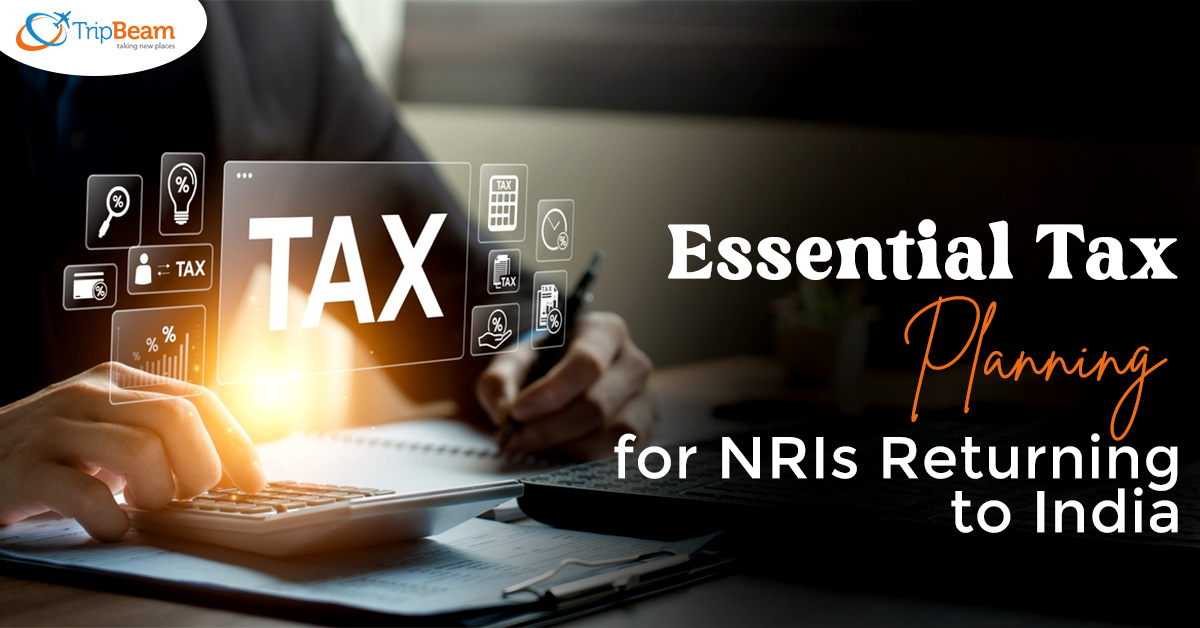

These days, it is common for Indians to achieve NRI status and live and work outside the country. However, you might decide to return to your motherland after spending several years abroad. Returning to India requires cheap tickets to India from Canada, financial planning, tax considerations and investment strategies like an NRI insurance policy. To assist NRIs, the Reserve Bank of India has published clear recommendations on many financial matters for individuals planning to stay overseas or return. Overall, tax provisions for returning NRIs are favourable. However, you must fully understand NRI taxation and tax planning if you intend to return to India. Read more on Tripbeam for comprehensive information on tax planning and tax rules for NRIs returning to India.
Generally, a person working abroad is labelled as an NRI, but the Income Tax Act has its definition. A “Non-Resident” is someone who doesn’t live in India permanently. NRIs often hold Indian citizenship or are of Indian origin but may have citizenship from another country. They maintain ties to India, can invest here, and participate in cultural activities. Thus, there are specific tax rules for NRIs in India. It is crucial to understand who qualifies as an NRI for tax purposes. Section 6 of the income tax law outlines three categories for individuals:
When someone does not meet the conditions to become a resident, they are classified as non-residents in India. According to the Finance Act, 2020, commencing from Assessment Year 2021-22, an individual is considered a resident in India for any preceding year if they meet either of the following conditions:
As per Section 6(6)(a) of the Income Tax Act, an individual is classified as NOR for the financial year they return to India and the following two years if:
After returning with Business class flight tickets to India, your NRI status is classified as NOR for 2-3 years. Following this period, you become an ROR, and the same taxation rules that apply to resident Indians will apply to you. Read more about NRI inheritance and the necessity of a will to protect your legacy.
When you return to India and your NOR status shifts to ROR, you will lose several tax benefits that NRIs and NORs enjoy. Therefore, it’s crucial to plan your taxes before this change. These benefits include:
Income earned by an NRI in India is taxable, but income earned abroad is not. Also, income earned outside India and brought to India in the same financial year by an NRI or NOR is not taxed in India.
When an NRI returns to India, their status changes to NOR, and then to ROR after a few years, during the period you have NRI or NOR status, you can benefit from the Double Tax Avoidance Agreement (DTAA) that India has with over 75 countries.
However, once your status changes to ROR, you will no longer be eligible for the returning NRI tax benefits under the DTAA. Additionally, your global income will become taxable in India.
For effective tax planning, if you intend to sell property abroad or withdraw from an overseas retirement account, it is advisable to do so before your status changes to ROR to avoid paying taxes on it in India.
Wealth earned outside of India is not taxable for NRIs. Upon returning with last minute flights from Canada to India, NRIs are given NOR status, which later changes to ROR status. As a resident Indian, you must pay tax on global income. Hence, understanding the tax implications of returning to India is crucial.
Tell us more details to help better






| Sun | Mon | Tue | Wed | Thu | Fri | Sat |
|---|---|---|---|---|---|---|
30 | 31 | 1 | 2 | 3 | 4 | 5 |
6 | 7 | 8 | 9 | 10 | 11 | 12 |
13 | 14 | 15 | 16 | 17 | 18 | 19 |
20 | 21 | 22 | 23 | 24 | 25 | 26 |
27 | 28 | 29 | 30 | 1 | 2 | 3 |
| Sun | Mon | Tue | Wed | Thu | Fri | Sat |
|---|---|---|---|---|---|---|
30 | 31 | 1 | 2 | 3 | 4 | 5 |
6 | 7 | 8 | 9 | 10 | 11 | 12 |
13 | 14 | 15 | 16 | 17 | 18 | 19 |
20 | 21 | 22 | 23 | 24 | 25 | 26 |
27 | 28 | 29 | 30 | 1 | 2 | 3 |